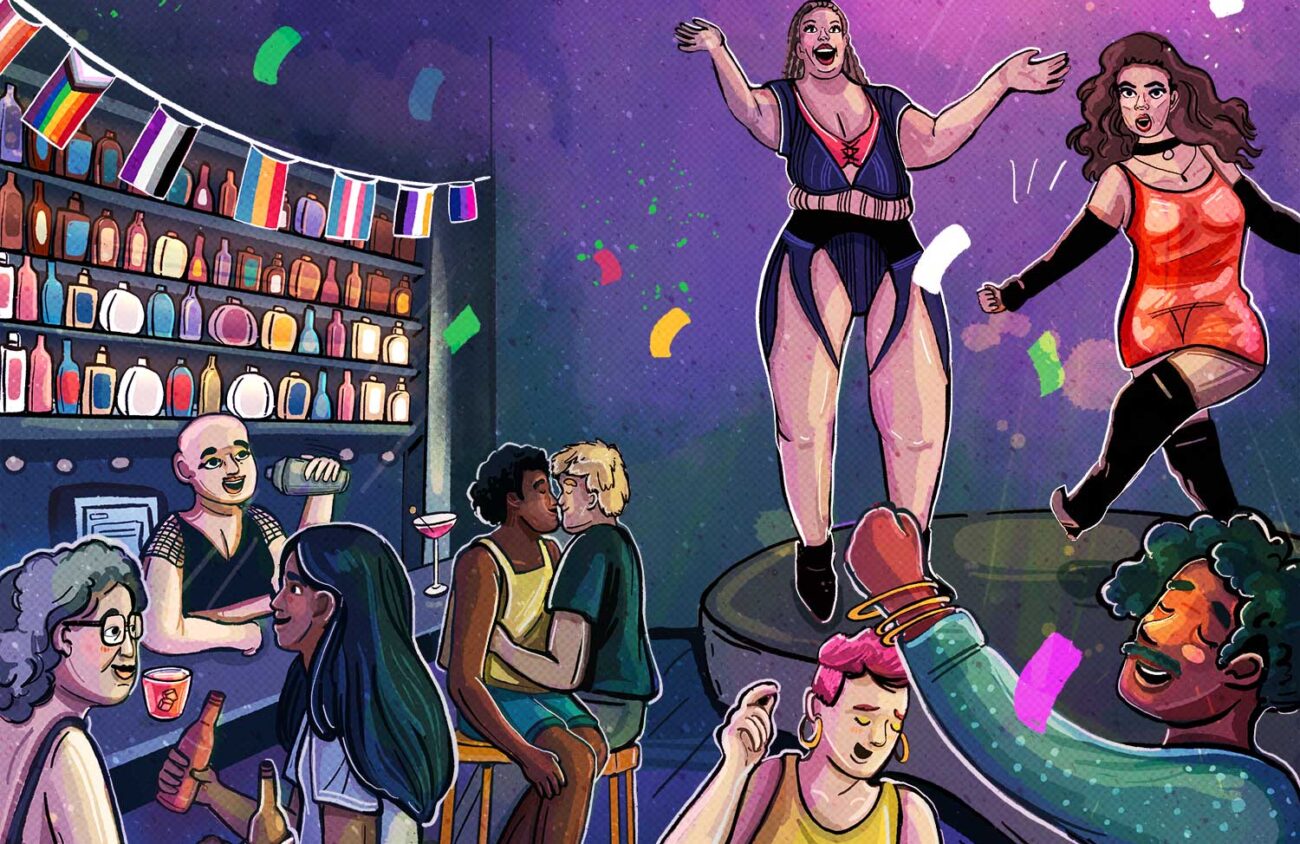I learned Spectrum Queer Bar was closing at a drag king bake sale in June.
Heavy Cream, the artist hosting the event, who Eugene Weekly readers voted Eugene’s best drag king in 2023, returned to the mic at the end of the show to thank the bar. Heavy Cream, he said, would not exist without Spectrum.
After Cream’s speech, drag king and burlesque performer Luke N. Good told me the cast had just learned that Spectrum would be closing August 12, right after Eugene Pride.
“I opened Spectrum to make Eugene a better place,” says Helen Shepard, Spectrum’s owner. Shepard says they wanted to provide a space where Eugene’s queer community could come together, build community and create change.
“One of the things I’ve always said is it’s a place to talk about the revolution, a place to plan the revolution, a place to be together at the end of the world,” they say.
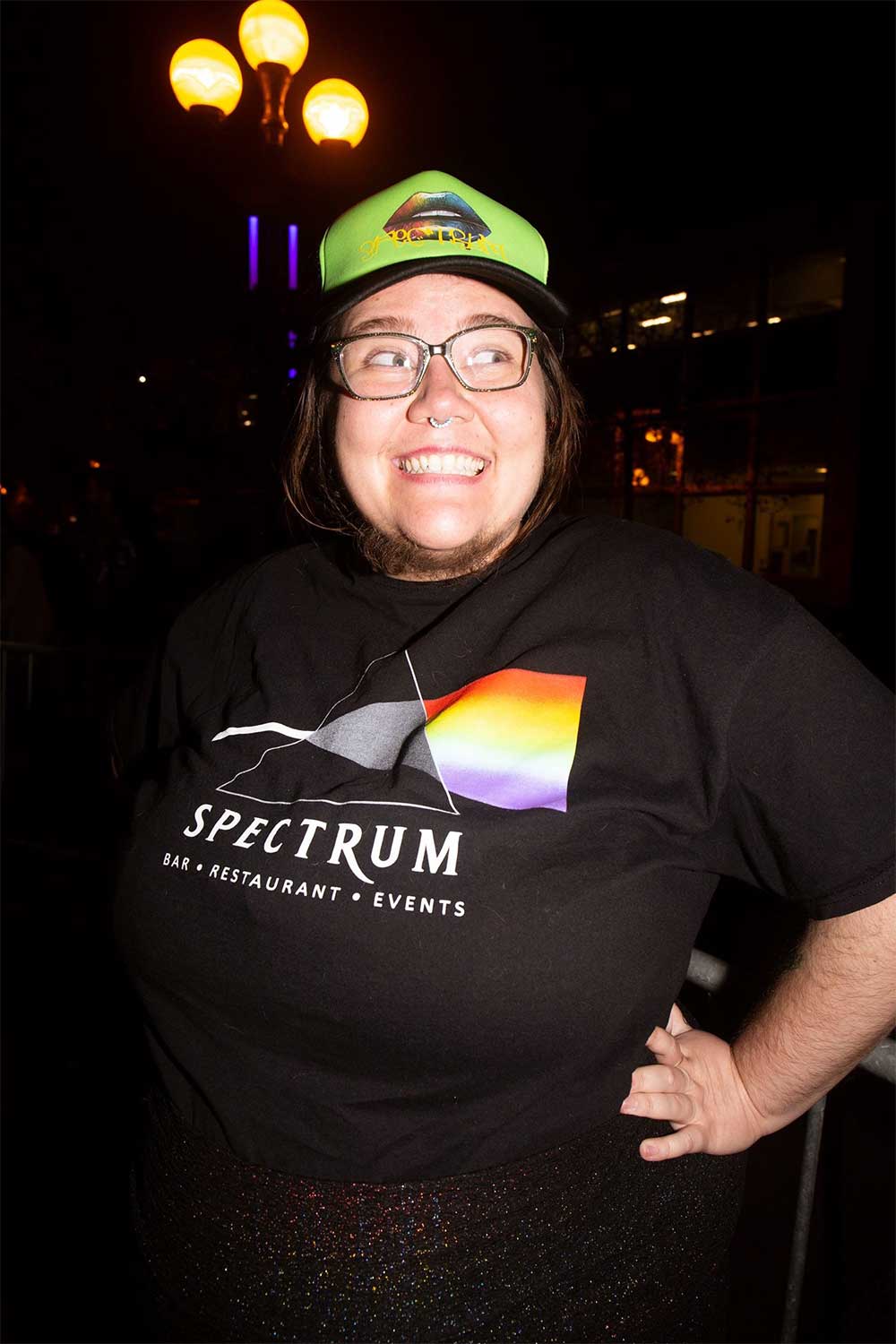
“The intention has always been for it to be a community space and for people to see it as more than just a bar,” Shepard says. That’s always been “a little bit of a battle,” they say; people came in because of a drag show or a dance party — which Shepard thinks is great — but didn’t necessarily show up in the same numbers for the other community-building events.
“I think what has made Spectrum special is part of what has made it somewhat untenable,” Shepard says. “It’s a lot of energy investment.”
They add, “Other bars are doing whatever they can to bring the most people in the door and sell the most alcohol, because alcohol is the thing that makes the most money. Here, we’re more concerned about the people that are inside feeling safe.”
Eugene is not without its queer-owned businesses and resources — TransPonder’s gender-affirming resource room, Sylvia’s Closet; the HIV Alliance’s work to make PrEP and injection supplies for hormone replacement therapy accessible; and wig shop Kissed by Ra’s drag closet come to mind — but Spectrum has stood as Eugene’s lone queer bar and queer community space since it opened at the end of 2018.
“There’s this idea that everyone is queer here, everywhere is welcoming,” says Brooks McLain, development director at HIV Alliance and president of Eugene Pride, “and so we don’t need those spaces, necessarily. That’s fundamentally not true.”
McLain says feedback from community youth, Pride attendees and their own personal experience has cemented the importance of dedicated queer spaces. Even in Eugene, McLain says, “flamboyant queerness and gender flexibility are not accepted everywhere.” Explicitly queer spaces give people somewhere they can go and just exist without judgment, he says.
As part of their work with the Alliance, McLain helped to secure a grant from Trillium Community Health Plan to open a queer resource center, in collaboration with other Eugene nonprofits. The goal is to provide an accessible, centralized space for the queer-specific resources that organizations including HIV Alliance, TransPonder and Queer Eugene offer, McLain says, as well as to “create a space where we can all be and be safe and support each other and bounce ideas off each other and create together.”
The group anticipates they’ll have a space operating by the end of this year, with plans for a grand opening in early 2025.
But for many of those involved in Spectrum — myself included, as a frequent patron — it will still be hard to see the bar go.
‘Everybody is welcome’
Ina Cook was the first person brought on for Spectrum’s staff as the bar’s head of security, six years ago. They often sat just inside the door, checking IDs and greeting patrons. “They see my ugly mug every time they walk in,” Cook says.
Cook has been in Eugene since the 1990s and has spent a majority of those decades as a bouncer at various queer gathering spots, working to keep their community safe. Most recently, they worked at the Wayward Lamb, the queer bar that closed in early 2018, in the same venue where Shepard opened Spectrum.
“This is my house,” Cook says. “This is my house, and it’s my responsibility to keep it safe, and this is my way of doing it, of being a bouncer.” They say ensuring Spectrum was safe and inclusive for its queer patrons was their way of helping their community.
From a well-lit front bar, to a back bar that serves as a space for parties and shows, to a lounge with plush chairs and books and puzzles, the bar tried to create spaces for a range of patrons, Cook says.
There were condom dispensers in the gender-neutral restrooms, a selection of local newspapers near the entrance and a photo booth tucked away in a corner with community members’ art hanging nearby. The bar’s events ranged from drag performances to dance parties to social mixers to game nights to poetry readings and the occasional punk show or comedy night. While many of the bar’s drag shows were limited to those 21 and older, a fair number of events were open to those 18-years-old and up and others were accessible to all ages.
“Spectrum is unique because it caters to everybody,” Cook says. “Even underage kids could come in, and they can come in with their little friends. I’ve had a lot of them call me ‘Auntie’ or whatever when they come in.” They add, “You get to know the regulars.”
Of all the bars Cook has worked in over the years — whether it’s an explicitly queer space or somewhere people have congregated in times when Eugene didn’t have a queer bar — Spectrum was their favorite.
“It’s just like the word says: spectrum,” they say. “You have a wide variety. Everybody is welcome.”
‘More than just a bar’
“Spectrum has really felt like a kismet experience,” Shepard says. “I’m always seeking those moments in life where you feel like everything in my life has led me to this point. Here I am, happy and living my best life. I’d love to think that Spectrum could be that for other people.”
Prior to opening Spectrum, Shepard was working as a clinical sexologist and was part of a burlesque troupe that did monthly performances at Eugene’s last “official” queer bar, the Wayward Lamb. Wayward closed abruptly in early 2018, with ownership announcing that the venue would be closing less than a week out from its final day of business. Shepard says their troupe had a show scheduled for the following weekend; the group had already made posters before they learned the show would not be happening.
Between the bar’s closure and Shepard’s general senses of underemployment and frustration with their life, they decided it was time for a change. “I saw it as an opportunity to take a risk and reinvent myself,” Shepard says. “I felt very passionately about the opportunity for queer performance art,” and that, they say, “needed to be in Eugene.”
By the end of 2018, Spectrum was up and running.
“I have had people tell me that they chose to move to Eugene because they came to Spectrum and it was so welcoming,” Shepard says. “I love the idea that Spectrum is part of a beacon that’s calling people who are coming from more troubled places to a place that’s more safe, to a place where community is more open.”
That meant closing before the state of Oregon required it in 2020, Shepard says, and hosting popup COVID-19 vaccine clinics during the pandemic. It meant the lounge, where people could take a second to sit down in a low-stimulus environment and hear one another talk. It meant all-ages shows. It meant a space that was accessible for someone to come in and get a drink of water and connect with their community, even if they didn’t have money to purchase anything.
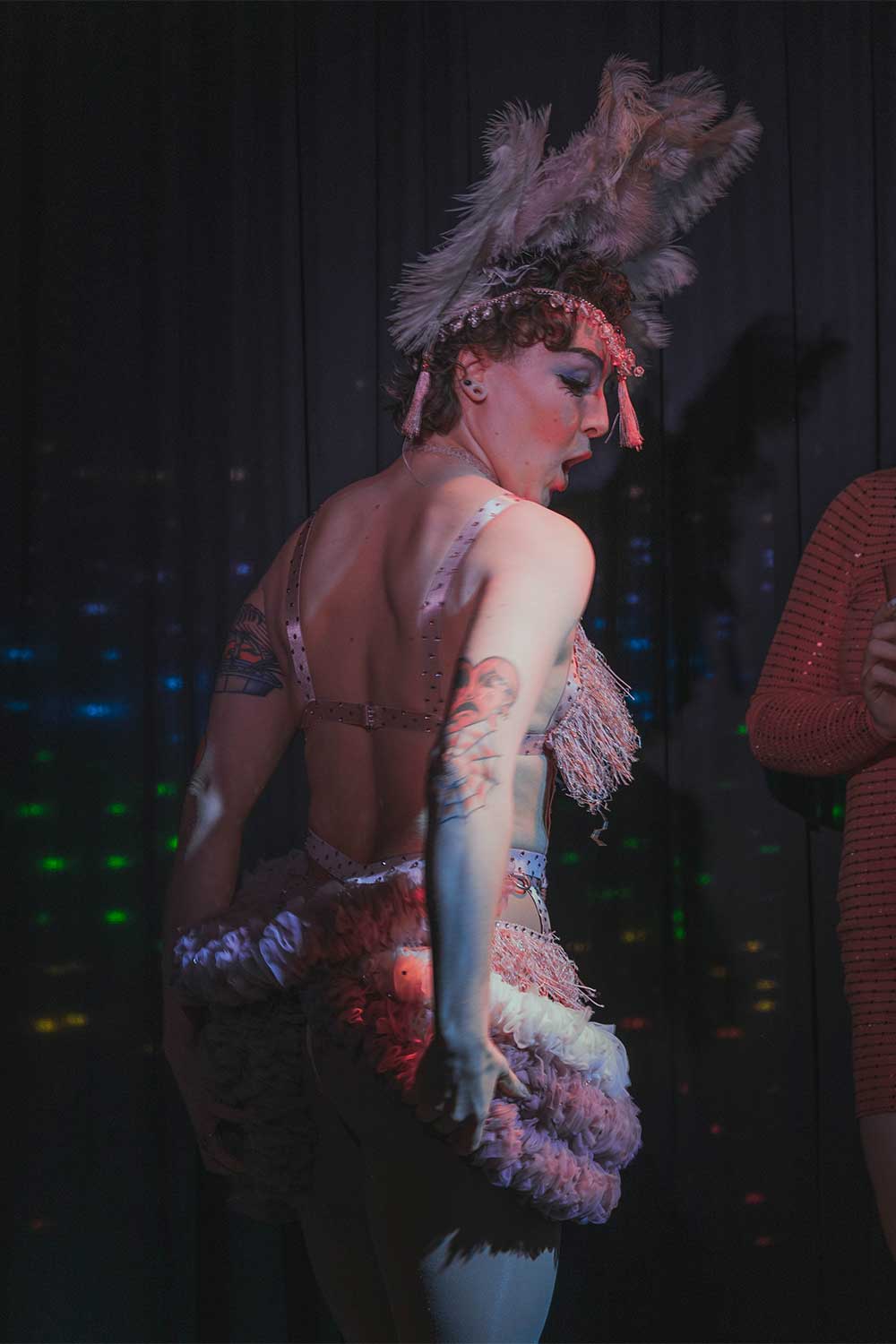
‘This is where I’m supposed to be’
Burlesque performer Sadie Jayne — or Lady Sadie onstage — first came to Spectrum for one of the bar’s daytime COVID-19 vaccine events. “I didn’t even realize it was a bar until I got here,” Jayne says, “and I was like, ‘Oh my gosh, what is this space?’”
The clinic was DJ’ed by Tinta Turnter, who is now Jayne’s wife.
Jayne didn’t actually get involved with the bar until about a year and a half later, when burlesque performer Bebe Boudoir invited Jayne to perform in a lesbian dance party she was hosting at Spectrum in June 2023. The next month, drag performer R.E.D. 4 Filth cast Jayne in her cartoon-themed show, Boi-oi-oi-oing. “That was a big eye-opener,” Jayne says.
As a burlesque dancer, the level of audience interaction at a drag show — walking through the crowd and collecting tips from attendees — was a culture shock. And although it was a little bit outside of her comfort zone, Jayne decided she liked it.
Jayne ended up talking with Boudoir, an assistant manager at Spectrum, and general manager Kiki Boniki about helping out as a bartender. Boniki also offered Jayne the job of hosting Spectrum’s monthly lesbian dance party.
“It felt like this is where I’m supposed to be,” Jayne says. “This is the path I’m supposed to be on.”
Jayne says they’ve now grown as a performer and as a manager — Spectrum’s the first place where they’ve been involved in management, rather than just bartending. And they have embraced the community surrounding the space.
“I hate that cliche of saying that it’s like a family,” Jayne says. “It’s not. It’s more intentional than that.
“People here really do look out for each other. There is a level of safety here because it is such a community space.”
For Jayne, that was especially evident in Spectrum’s all-ages drag shows, which combated the idea of drag being inherently inappropriate for children and opened space for attendees and performers in all walks of life.
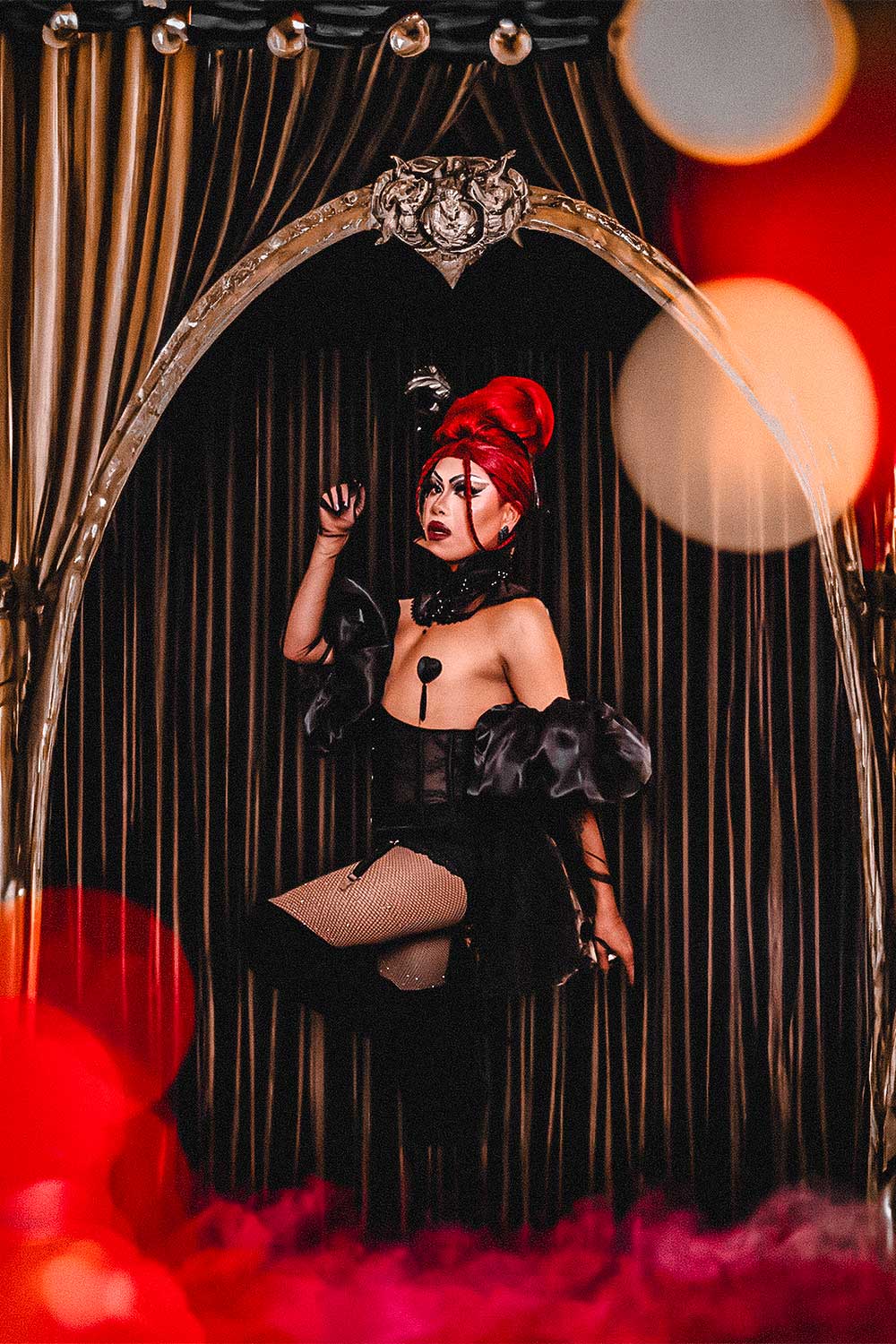
‘An incredible place to meet people’
Producing a show at Spectrum was JD Rodejo’s way of giving new drag performers a platform. “When I was starting, I felt so welcomed,” says Rodejo, who performs as the drag queen Morena. “I felt so accepted.”
Morena’s story starts outside of Spectrum, but Rodejo and their husband started going to the bar as soon as it reopened after its COVID-19 shutdown. “We went there because we wanted to check out the queer scene in Eugene,” Rodejo says. “And, no lie, to find friends.”
Rodejo and his husband moved to Eugene from Japan during COVID-19 so Rodejo’s husband could attend law school at the University of Oregon. Since being in community with fellow queer people had been so freeing in Japan, Rodejo says he wanted to intentionally seek that out in Eugene.
That first time they walked into Spectrum, they found that community. “I think it’s an incredible place to meet people,” Rodejo says. “I think it’s an incredible space. Most people just didn’t give it enough [of a] chance.”
The duo started to frequent the bar. They attended RuPaul’s Drag Race watch parties, where I met them, and open-call lip-sync nights. When the bar held its first all-ages drag brunch since COVID-19 in May 2022, Morena was named to the cast.
The opportunities kept coming. Morena performed across town and hosted lip-sync nights, Drag Race Philippines watch parties and TransPonder’s annual gala. She even had the chance to open for Chappell Roan when Roan was on tour in Portland last year.
Morena’s HotPot — an all-ages drag competition for new performers, which will hold its last show August 9 — is Rodejo’s way of giving back. It’s difficult to ask for bookings as a new performer, for a multitude of factors, he says. HotPot was designed to mitigate some of those: there’s a form performers can fill out to apply instead of having to bug an established producer for gigs, artists can compete with fellow new performers instead of alongside established queens, and the show is open to all ages, when many casts are limited to those 21 years or older.
HotPot’s first winner, Daizy Dukez, was 14 when she took the title.
“These are some opportunities that I wish I had when I was 16,” Rodejo says. “Although I didn’t know I was gay.”
A queer space intentionally run by queer people
Kody Russell also started frequenting Spectrum once it reopened. She’d go to hang out and perform in the occasional lip-sync night, getting to know the bartenders in the process. Russell had already started to put together the pieces of their drag persona: R.E.D. 4 Filth, “Eugene’s only drag toy,” per their Instagram bio.
After a couple months as a patron, Russell and two of the bartenders created a show proposal for Boi-oi-oi-oing, a monthly cartoon-themed drag show that aimed to provide a space for queer people to be nerdy and sexy and dumb. The production made its debut in May 2022, with R.E.D. as the host.
“Everything about Spectrum has helped me grow as a person,” Russell says. They’ve produced a show that’s run for over two years and joined the bar as a member of its staff. They’ve learned to engage with a more diverse community than they encountered growing up in the Coos Bay/North Bend area. They’ve grown more comfortable in their trans identity and the way they experience attraction. “I’ve also had the joy of being behind the bar or behind the mic or just there in general while watching other people find out who they are and be more comfortable with that,” they say.
Russell says she’s witnessed the value of the space across all age groups, including the teenagers that come in after school on a Tuesday afternoon to do homework and hang out with their friends. “I’m happy for that to exist,” she says. When she was in high school, “there was not a place where — not even as a queer person, but as a teenager — I felt like I wasn’t being judged at some level for just being there.”
Part of what made Spectrum special, Russell says, is that it’s a queer space intentionally run by queer people. “We could hire a big, burly straight man,” she says, “and they’re great for security. There’s no denying that.”
But Russell says many trans and queer individuals have negative experiences with the big, burly straight men of the world. “If a straight person wants to come into our space, it’s them needing to be comfortable with being around trans people and queer people,” she says. “No queer person should have to feel uncomfortable coming into a space that’s supposed to be for them.”
‘We’re not going anywhere’
“I’ve never had a gay bar or a queer space where I could just exist,” says Evan Santana, who moved to Eugene from Southern Oregon in 2020. He didn’t know Spectrum existed until late 2022, when he went to see a rock show there with his then-partner.
“We went to get water up in the front, and there was a drag show up there,” Santana says. “So we stopped and we watched it and we lost our minds. I was like, ‘I have to do this. I have to start coming here.’”
Santana and his ex started coming to shows when they could and performing at Spectrum’s free weekly lip-sync night. “I was kind of depressed,” he says, “and it was something to look forward to that was free every week. I could get all dressed up and just dance.”
Angel Face, Santana’s drag persona, started as a very feminine character — the gender presentation Santana assumed he should adopt as a trans man — but that’s evolved over the past year and a half. These days, Angel Face is more of a drag king or drag being. “I’m still a male personified [person] dressing feminine,” he says. “But also, my whole lore for Angel Face is that they’re an angel, and angels don’t have gender […] Gender isn’t real for me; I just be dressing. I like having multiple faces for this persona.”
As Santana became a recognized figure at Spectrum, he began to pick up shifts at the bar. Over time, that turned into him being a regular bartender and drag performer, and hosting an all-ages mixer night for transmasculine individuals. “When I was first coming out as a trans person, I wished I had other people I could go to,” he says, people he could’ve asked, “What do I do? How do I get binders? How do I do this? Or just have friends that I feel like I can be myself around.”
So much of that feeling of companionship comes in being in an explicitly queer space, Santana says, “but I also think it’s important that we have such a strict no-bullshit tolerance at Spectrum. If people are being problematic, we immediately are like, ‘You need to leave,’ because we don’t have time for that. We want this to be a completely safe space, which means zero tolerance for a lot of stuff, which has gotten us backlash, but it’s only from people that don’t like us.”
Even with Spectrum closing, Santana isn’t afraid of losing the queer community in his life. “We’re not going anywhere,” he says. “We’re just losing the meetup spot.”
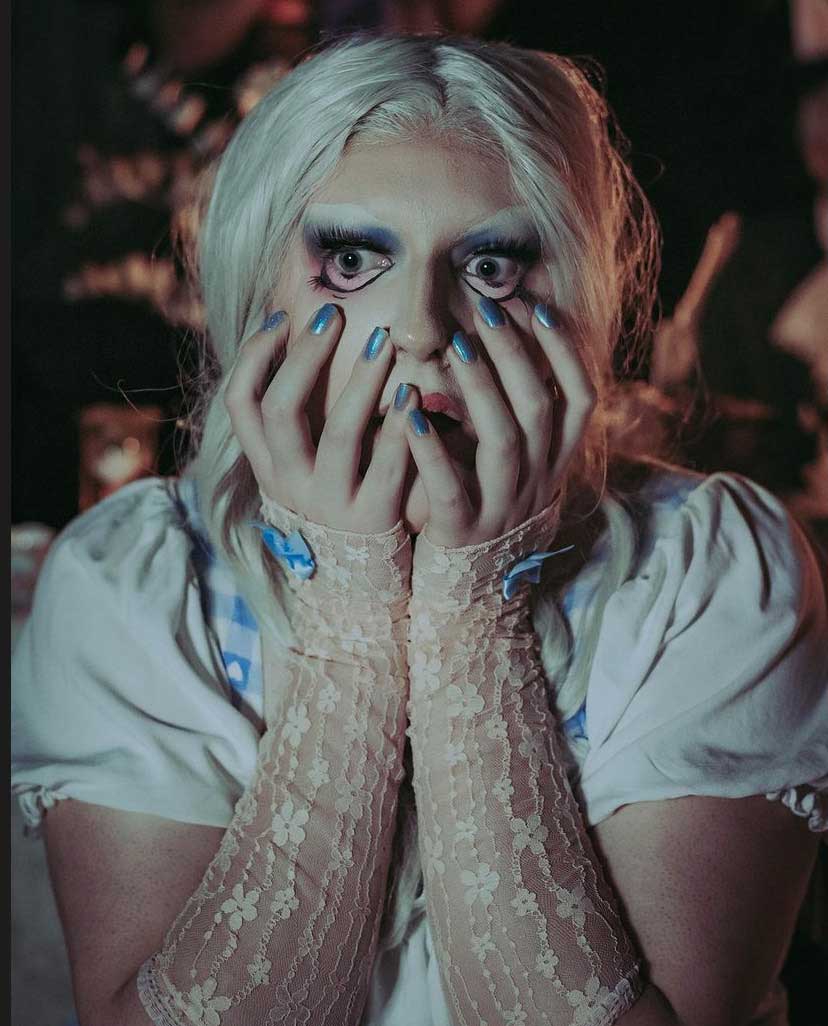
‘It’s all art’
Drag was Ellieanna Doner-Barrong’s introduction to Spectrum. “I was underage when I first started performing,” she says, “so I wasn’t allowed into the bar unless I was performing.”
Doner-Barrong made her drag debut as Shirley Mental in the first drag brunch since the bar had closed for COVID-19 in May 2022. She became a regular cast member and sometimes hosted the weekly show.
“When I first came here, I thought that the space was really welcoming,” Doner-Barrong says. “I felt very safe here, and I still feel that way to this day.”
She continues, “I still feel like this space is very protective. I feel like I can be myself here, where in other bars I don’t necessarily feel that way. This bar feels like an organism, like people live in this space.”
That sense of being herself, and support from the bar, allowed Doner-Barrong to create events she is deeply invested in. She hosted a queer Dungeons & Dragons group twice a month, the core of which has grown pretty tight-knit. “A lot of these people started coming for queer D&D, and now they’ve become a part of the Spectrum regulars,” she says. “A lot of them still come to the bar and come to my shows, and it’s really sweet. We have a Discord together.” Doner-Barrong has no doubt the group will continue to meet after Spectrum closes; it’s more a matter of finding the best place to do so.
Doner-Barrong is also on the lookout for somewhere to take Shirley Mental’s Funhouse, a show she hosts and produces that celebrates the art of drag. “I felt like there was a space missing for people to be avant garde and be different and express that,” she says. “It’s all art, and that was the point, too.” She references a drag number by HottBoxx 9000, where they ate a baby onstage to critique narratives that portray drag queens as monsters who are harmful to children.
“When people think of drag shows, when people are producing things at a bar, they’re thinking of the drag that you see on Drag Race,” Doner-Barrong says. “That’s just not what I’m going to be putting out. I want people to express themselves and do their own little unique thing.”
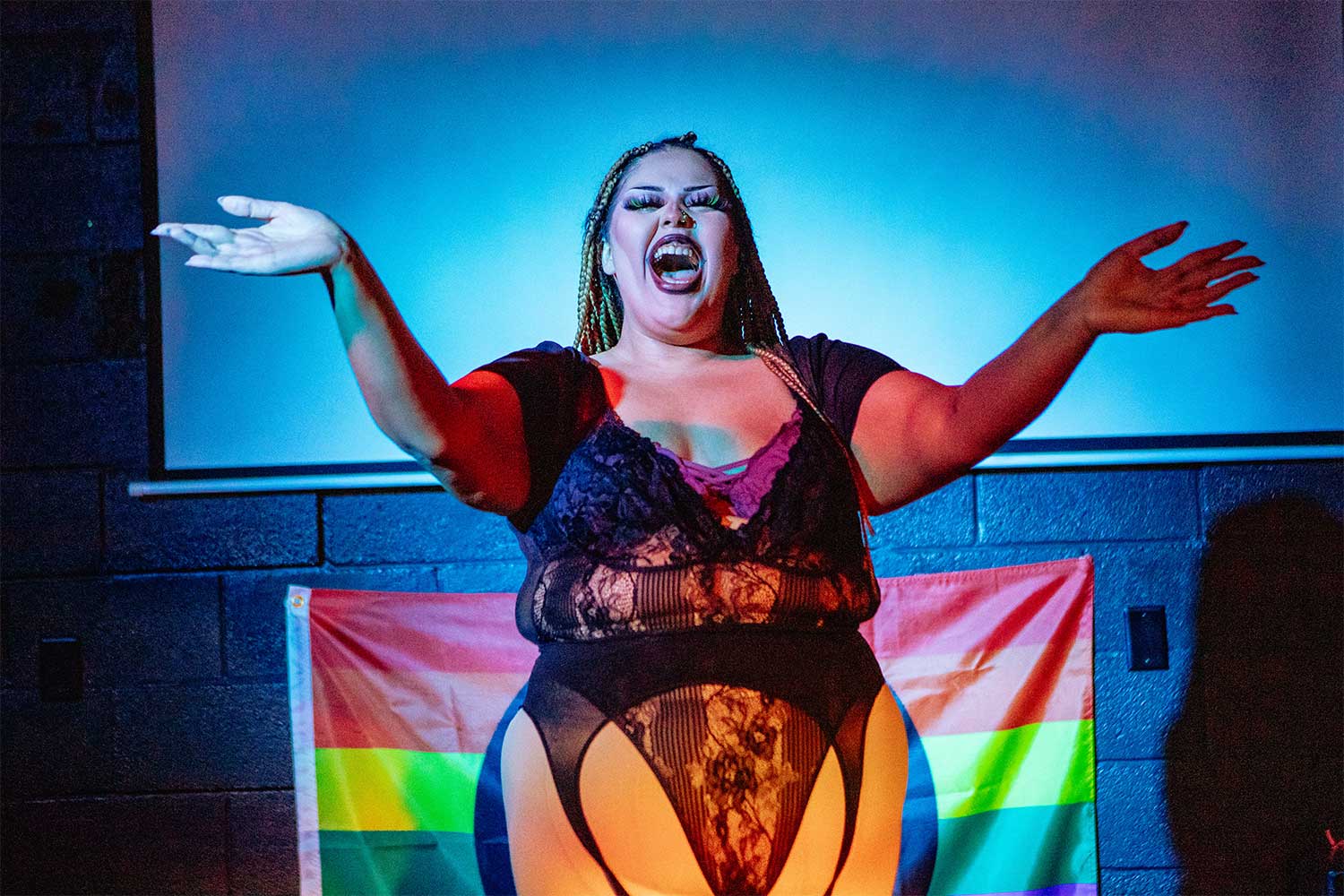
‘If you’re here, you belong here’
When Dez Brock moved back to Eugene at the end of 2021, she didn’t really know what was coming next. As she re-established herself in town, she ended up volunteering to design a couple of show posters for drag performers. That turned into DJing at a couple drag gigs.
“One of my friends who’s a drag queen was just like, ‘You should do drag, too. It’s not that serious,’” Brock says. Brock and their friend — Candy Whoreholla, who Eugene Weekly readers voted best drag queen in 2021 — went to a lip-sync night at Spectrum at the end of 2021.
“My first night here, there were tons of people that were like, ‘I’ve never seen you before. Who are you?’” Brock says. “But in a very supportive way, like, ‘I don’t know you, and I feel like I should because you’re here.’ It was very welcoming.”
It didn’t take long for Brock to establish Lyta Blunt, their drag persona, at Spectrum. Alongside performing around town, they started hosting RuPaul’s Drag Race watch parties when season 14 kicked off in January 2022. A couple months later, they were also putting together Spectrum’s drag brunch and producing their own monthly show, Bad Bitches Only.
Although Brock was new to drag, she had a background in production and hosting. She says she felt like the staff at Spectrum recognized that from the beginning and were willing to give her opportunities. “I feel like they really heard me out in a big way,” Brock says. “That definitely stood out to me. They were willing to give newer people a chance, too, which is a huge part of sharing resources and space.”
The platform that Spectrum gave Brock allowed her to pass that chance on to other new performers in the community. “There’s a lot of people who have told me that I was their first paid booking,” she says. “For most people, I didn’t even realize that when I was reaching out to them. I just saw that they were excited, and I liked what they were bringing and wanted to give them an opportunity to get onstage.”
As time went on, Brock began to cultivate those chances in a more intentional way. They started their own drag house, the Haus of Blunt. “I was so overloaded with opportunity,” they say. “I wanted to be able to pay that forward to other people in my community that I knew not only deserve the opportunities but also had art that really needed a hand up” — either in the form of a platform to express that art or of money to execute the visions they had.
Brock says the space Spectrum gave them has also helped them grow as a person and as a drag artist. They’ve learned to navigate Eugene’s queer community as someone with a platform, they say. “It’s shown me how important radical inclusivity is,” they say, “and how important it is to give people a chance to be part of something.” That’s a feeling they want to carry into their productions outside of Spectrum, they say.
“If you’re here, you belong here,” Brock says. “I don’t need to know anything about you in order to know that you deserve to be here, too.”
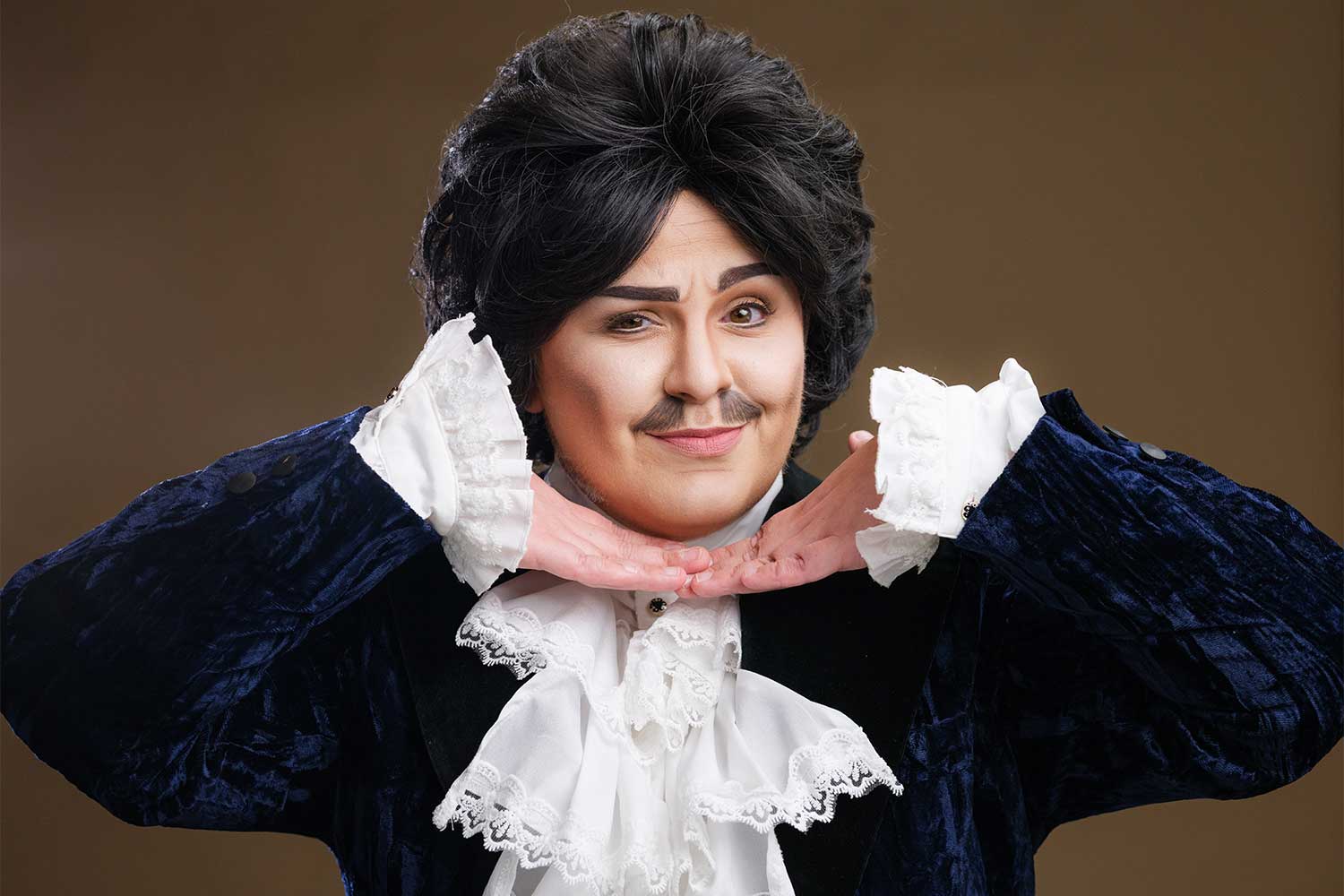
‘It opened up myself and my identity’
Heavy Cream’s first time at Spectrum was for a drag workshop series that Lyta Blunt hosted in October 2022. “I remember being greeted by the bartender, which caught me off-guard,” he says. “Usually, when I go into bars, no one talks to me, no one acknowledges me. They checked in with me, made sure I was OK, asked me if I needed anything, and that helped me feel more comfortable there.”
The workshop only added to that sense. Blunt went over the basics of drag, Cream says, and something just clicked for him. “I feel like drag was the thing I desperately was searching for in my life,” he says. “It was the perfect medium for me. It really encompassed all of the things I love and am passionate about.”
Beyond the props and costumes and dancing, Cream says the workshop was personally validating. “It made me, for the first time in a long time, feel comfortable and safe to be my true self,” they say. “So [it] not just opened up a lot of connections with friendships, it opened up myself and my identity.”
Cream says tapping into his identity out of drag helped him create his drag persona. “The strongest performances are personas that do relate to you,” he says, “because then you can tap into that character and really embody that character because that’s an aspect of you in some way. Even if it’s a characterization or play off of that, it’s still reflective of who you are. Whenever you’re being your true self, that’s just the most beautiful thing you can be.”
Cream says their drag was also heavily inspired by Eugene-based king Edd Zackly. “It’s a perfect example of why visibility is so important and why good representation is so important,” they say. “A big part of the reason why I got started in drag was because I saw Edd Zackly, and his style and approach to drag really resonated with me.”
Seeing drag kings and things — a gender-neutral term that some artists use to describe their personas — expanded Cream’s definition of what the art form could be.
“It really inspired people to go out of that bubble of queens and femme drag,” they say. “Masc drag is a thing, too. Gender can be whatever we want it to be, and we should have a space for everyone to express and explore that.”
It helped that Cream was finding his footing at the same time as a handful of other drag kings and things in Eugene. The new performers, including Angel Face, who was also in Blunt’s drag workshop, and Luke N. Good, “banded together,” Cream says. Many of those artists — Angel Face and Luke N. Good among them — are now part of Cream’s transmasc-led drag house, the Haus of Créme.
‘Be your own cheerleader’
Andrew Arriola has been involved in Spectrum from the get-go, at least peripherally, as general manager Boniki’s partner. But when Spectrum opened in 2018, they were working at a retail job in Eugene.
As businesses began to repeal their COVID-19 safety precautions, Arriola says they were uncomfortable with the amount of face-to-face interaction demanded of their job in an ongoing pandemic. So Boniki brought Arriola onboard at Spectrum.
Arrirola started by helping with sound and lights at shows. They later began to DJ events as DJ Android.
“I’ve built a little second home there,” Arriola says, “a little second family, as well.” Gaymer Night, which DJ Android hosted every Wednesday, had a handful of regulars that have been attending for over a year. If Arriola’s running late or can’t make it, the group still got together to play games.
“I love the people at Spectrum,” Arriola says, “very much. I’m very sad to see it end. I don’t know what anybody is going to do, including myself, going forward.”
Even as a queer bar, Arriola says, Spectrum was unique in that it tries “to welcome everybody in that spectrum of queerness,” while many other queer spaces specifically cater toward gay, cisgender men. “I feel really bad for the younger people who have been coming to Spectrum,” they say, “because out there in the world, there’s not a lot of queer spaces for gender-nonconforming people, nonbinary people, trans people.”
Especially given the range of people represented at Spectrum — in its staff, performers and patrons — Arriola tries to get people to come out of their shells, talk to one another and build community. “I’ve always acted as a cheerleader for people,” they say.
When he’d DJ open-call lip-sync nights, Arriola tried to do a couple numbers, too. Since he was performing as DJ Android and not as someone in full drag — though he did recently make his lip-sync drag debut as Seductron 6000 a couple weeks ago — getting on stage showed people that they could also get up and do a number, even if they don’t have a full face on.
But people are going to have to find and create that confidence outside of Spectrum, Arriola says.
“Get out onto the dancefloor,” they say. “Nobody’s judging you, I promise. If it’s a dance floor at a club, most people are probably drunk.” But you don’t need alcohol to have a good time, Arriola says. They’ll sometimes find themself in a dance fever, a natural high just from getting out there and moving.
“Be your own cheerleader,” Arriola says. “You’ve got to get out there and interact with people. I’m talking to the younger queers in Eugene, because there’s a lot of shy younger people in this town. Talk to each other, cheerlead each other, cheerlead yourself if there’s nobody there to cheer you on.
“Look in the mirror, picture a little DJ Android [on your shoulder] saying, ‘Yasss, bitch, werk.’”
Spectrum will host its farewell show — and unofficial Eugene Pride afterparty — at 10 pm August 10. The venue will be open for its all-ages Sunday brunch August 11 at noon. Folks looking for queer resources can reach out to organizations like Eugene Pride and TransPonder.
